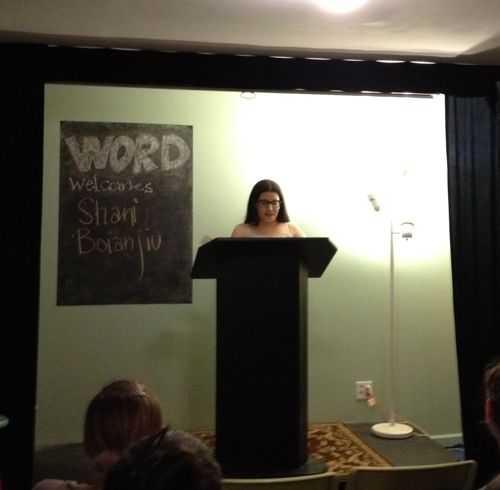
Israeli novelist Shani Boianjiu was promoting the paperback release of her acclaimed The People of Forever Are Not Afraid with a reading in Greenpoint. The novel follows the lives of teenage soldiers serving the Israel Defense Forces, a story inspired by her own compulsory time served. She wrote the novel when she was just twenty-three, based on several stories she wrote in class while attending Harvard University.
She begins by admitting that this evening is her first “real” reading in the United States, aside an informal event held in a senior citizen center. Before she has a moment to reconsider, begins reading the narrative with a steady voice.
She reads a passage following two young soldiers on patrol and eating cheeseburgers. If these events seem mundane and ordinary, that is partly the point: teenagers in perpetual war. The voice is light and humorous, even when the female character jokes about her pregnancy.
The banter between these characters and the playfulness of the narrative voice carries the narrative through the more threatening situations, like the character illegally crossing a border. That is the magic of this text — tricking the reader into consuming some more serious subject matter with a jocular narrator.
Boianjiu finishes reading to with applause, the characters left in precarious situations, ordinary if they were not on the front lines.
Released last year, Boianjiu’s novel has achieved rapid success. She is currently working on a Hebrew translation. She explains when she wrote the novel, she wanted to write English almost as if it were Hebrew, in the same kind of way. She wanted these characters to sound like eighteen year olds. Later, elaborates on the complexities of Hebrew literature: the language evolves far more quickly than English. Hebrew texts quickly sound dated and silly to contemporary readers because of the pace of change, unlike English. For her, this is the most difficult part of the translation.
The People of Forever Are Not Afraid is in essence a war story, the youthful characters locked in a conflict. The trepidation felt by these characters is not intrinsic to the plot. Americans can relate because war stories are about violence — and any American can understand violence in a personal way. The IDF is an “army of children,” and that was the experience she wanted to capture.
When asked whether she is concerned about controversy surrounding the book once its translated, Boianjiu responds: “There are no controversial books in Israel.” She clarifies by saying that there are many outlandish and outrageous books published in Israel all the time, and while people critique them, books do not generate the kind of contention as happens in the United States.
Of course, she adds, “I’m sure a lot of people will hate it.”
The conversation turns towards the issue of women and writing. An essay published in The Atlantic last month claimed women wanting to be writers should limit themselves to just one child. Boianjiu added her voice to the many others criticizing the essay: she described the article as “gossipy,” pointing out that it was more with who the women slept with rather than any of their literary accomplishments. In short, she disagreed. Boianjiu, who just turned twenty-six, saw the article as bad advice for young women.
Other authors her age might find pressure in garnering success at such a young age, but she sees it as a strength. She explains, “as a young woman, you are always the least important person in a conversation or in the room” and in that she finds power. She relies on this invisibility. It allows her the power of observation, undetected. “To be well read and well educated, and to own the body of a young female person is the most powerful tool as a writer.”
She always knew she would write. She expected to publish books in some capacity, but never really expected it all to happen this way, with this kind of success so early. “I thought I was going to be a banker,” she says. “They make a lot of money.”